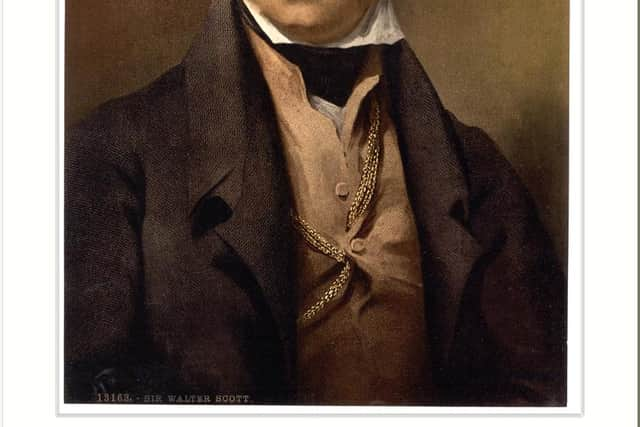Sir Walter Scott: Errors to be written out of poems in £1m project
Researchers at Aberdeen University have received funding to revisit Scott’s original manuscripts, which were composed in the 19th century.
The speed of publishing driven by an unquenchable thirst for his work – combined with his notoriously spidery handwriting – meant many errors occurred as they made their way into print.
Advertisement
Hide AdAdvertisement
Hide AdExperts at the university’s Walter Scott Research Centre now aim to return his poetry to a form that more closely reflects the writer’s original intentions and include his long notes on characters, time and place for context for the reader.


The project will be led by Professor Alison Lumsden, who has developed expertise in reading Scott’s handwriting through her work in creating the Edinburgh Editions of his novels.
Prof Lumsden said: “Unlike Walter Scott’s novels, which have never been out of publication since they were released, there are very few editions of his poetry and those which do exist are severely compromised by 19th-century editing practices.
“Scott was a prolific writer and, as well as the poems themselves, he produced long notes which are almost like alternative stories.
“He wrote these to offer a greater insight into the characters, events and experiences contained within his verse, but these almost always disappeared in modern printed versions.
“We want to reinstate Scott’s notes as part of the reading experience and to establish texts as close as possible to the author’s wishes.
“Scott continued to revise his poems between editions and for The Lady of the Lake, for example, six different versions were printed within six months, so it is easy to see how errors begin to creep in.”
The project will help create the first half of a complete edition of verse, which will span ten volumes in time.
Advertisement
Hide AdAdvertisement
Hide AdHis poem Lady of the Lake, which spans six cantos, is credited with helping to found the Scottish tourist industry.
More than 23,000 copies of the poem, set around Loch Katrine and the Trossachs, were sold – a literary phenomenon of its time – with the image of romantic Scotland sold along with the verse.
Prof Lumsden said: “In the year that we celebrate the 250th anniversary of Scott’s birth, this award underlines his continued relevance not just in Scotland, but on the international stage.
“The basis of the modern image of Scotland and our sense of Scotland is embedded in Scott’s writing.
“He is such an important part of our cultural heritage and this project will ensure that his legacy is preserved with the accuracy and detail it deserves.”
The funding has been awarded by the Arts and Humanities Research Council.
Scott’s influence on Scottish culture – and how Scottish culture is defined – is immense He has been credited with popularising tartan, saving the Scottish banknote and rediscovering the nation’s Crown Jewels.
His string of bestsellers, such as the Waverley series of historical novels, dominated the 19th century, changing how the world saw Scotland and Scotland saw itself.
A message from the Editor:
Thank you for reading this article. We're more reliant on your support than ever as the shift in consumer habits brought about by Coronavirus impacts our advertisers.
If you haven't already, please consider supporting our trusted, fact-checked journalism by taking out a digital subscription.
Comments
Want to join the conversation? Please or to comment on this article.
